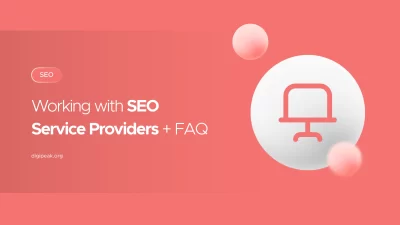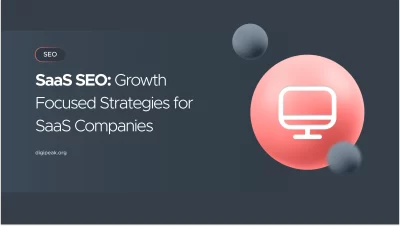
Working with SEO Service Providers + FAQ
Whether it's your first or third time hiring an SEO company, it is a step …
SEO -
10/02/2025 -
7 dk okuma
Stay up to date with Peakers
In the digital age, not having a website for your hotel is one of the fastest ways to lose credibility and customers.
But is having a well-designed website enough to attract visitors from Google?
NO!
SEO for hotels means ensuring your website ranks higher in search engines, attracts potential customers, and ultimately converts them into guests.
In this guide, our experts will teach you everything you need to know about hotel SEO to help you stand out in this competitive landscape.
Search Engine Optimization (SEO) is the process of optimizing and improving a hotel website’s ranking on search engine results pages (SERPs) like Google, Yahoo, and Bing.
It enhances your online presence, drives traffic to your website, and increases hotel bookings.
It’s important to note that SEO is an essential part of digital marketing for hotels and one of the most effective strategies to outperform competitors.
When your target audience searches for anything online, search engines provide them with a list of results.
Most people click on the first website they see because they believe it offers the best answer to their question.
Very few users click on the second, third, or fourth results.
According to Backlinko, the #1 result on Google gets 31.7% of all clicks.
By comparison, the last result on the first page receives only 2.2% of clicks, meaning users are unlikely to visit the second page.
If your target audience doesn’t find you on the first page, they will likely never discover your hotel.
There are various hotel SEO tips, but knowing which ones are most effective is crucial. To help you implement SEO correctly, I’ve compiled 15 actionable steps.
This is the first step in hotel website SEO. You need to define your target audience—who they are, what they like, and their booking patterns.
Here are some examples:
| Accommodation Type | Most Likely Target Audience |
| Hotels | Leisure travelers (general audience) |
| Resorts | Vacationers (families and groups) |
| Short-term Rentals | Business travelers |
| Hostels | Budget travelers, solo travelers, backpackers |
(Note: These are general observations and may vary based on different accommodation types and sizes.)
Once you understand your audience, consider what they search for when looking for accommodations.
For example:
If you own a resort, your ideal audience might search for:
These are called search terms. Identify a few and determine the primary search term your audience frequently uses.
Important: What visitors search for are terms, and their intent behind the search is known as search intent.
These search terms are nothing but keywords in SEO. Let’s dive deeper into what they are, why they matter, and how to use them.
Keywords are the terms and phrases people use to find your property online. Instead of using broad terms like “hotel,” focus on descriptive, location-specific keywords like “beachfront all-inclusive hotels in Bodrum”
Rather than stuffing your web pages with keywords, distribute them naturally throughout your content. Keyword stuffing can get your site penalized by Google.
Also, don’t forget to include relevant keywords in your website’s metadata.
For example, the first result in the screenshot above is perfectly aligned with the target search term. This is crucial for on-page SEO. If you want to learn more about SEO basics, check out our “How to Do SEO?” guide.
SEO in the hospitality industry is challenging because your hotel competes with travel giants in Turkey like Enuygun, Trivago, Expedia, Booking, and TripAdvisor.
These platforms have established authority, attract massive organic traffic, and are considered high-authority sites by Google.
When using keywords on your hotel website, write for people, not just search engines.
There are two key types of links in SEO:
The more quality backlinks you gain, the more valuable your site appears to search engines. However, ensure that the links come from relevant and diverse sources.
SEO requires fresh, accurate, and relevant content. Regularly update your website and continuously produce unique, engaging content to show search engines you deserve top rankings.
One simple way to do this is by blogging weekly. Include your target keyword at least once per blog post (e.g., “how to book a hotel”) and link to other relevant pages on your site.
Your main content should also feature target keywords. However, they should blend naturally into the text.
Search engines prioritize relevant and high-quality content, so avoid overstuffing keywords.
A responsive, user-friendly website is essential for ranking high on Google. Conduct regular health checks to ensure there are no broken pages.
Also, evaluate the online booking experience for your guests.
For small hotels, generating positive reviews is a critical factor for success.
Consider this:
Moreover, online reviews are one of Google’s most important ranking signals, meaning they are a key part of any hotel SEO strategy. Encourage guests to leave a review after their stay and ensure your business is listed on major directories like TripAdvisor, Google My Business, and Facebook.
Local SEO is the process of optimizing your online presence specifically for location-based searches—think of someone searching for hotels on Google Maps or typing “[CITY] hotels” into a search engine.
As you can imagine, local SEO is crucial for hoteliers, as hotel searches are inherently location-driven. The good news? There are simple ways to improve your local SEO performance.
Search engines like Google scan your page titles and content to determine your ranking on search results pages.
Use your target keyword on your page and include variations of it in your headings.
For example, if you run a hotel in Alaçatı, you’d want to rank for keywords like “Best Hotel in Alaçatı”, right?
Your website’s meta data might not be visible to guests, but it is highly visible to search engines ranking your site.
That’s why it’s crucial to optimize meta descriptions and keywords with your target terms. Adding a location to your keywords is especially important for businesses in the travel industry.
Understanding SEO is more important than ever for hotel marketers and industry professionals.
To summarize, search engine optimization is a valuable and long-term investment strategy for hotels.
Social media might not always be flashy or fun, but integrating SEO into your hotel marketing plan is an effective way to increase brand awareness, drive organic traffic, and ultimately boost direct bookings in the long run.
Get an Offer


Join Us So You Don't
Miss Out on Digital Marketing News!
Join the Digipeak Newsletter.
Related Posts

Whether it's your first or third time hiring an SEO company, it is a step …

Global e-commerce sales reached $6.86 trillion in 2025, and they are expected to hit $8 …

In today's digital world, SEO is no longer a luxury but a necessity for SaaS …

App Store Optimization, or ASO for short, is the process of optimizing an app or …